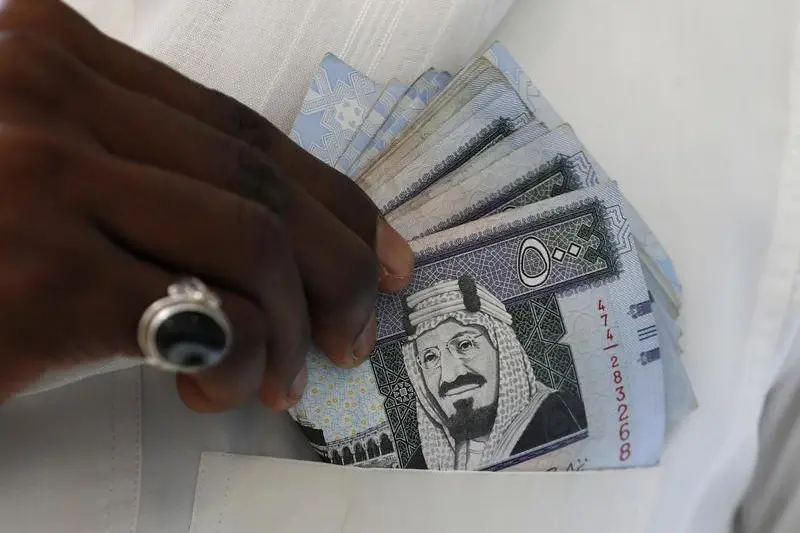PHOTO
The Gulf's sovereign bond market could be the next to benefit from inflows worth billions of dollars via an upgrade to an emerging market index, according to UBS.
Major stocks in equity markets both in Saudi Arabia and Kuwait have recently received investor support following the news that they have either been upgraded or added to a watchlist for a potential upgrade by index compilers MSCI and FTSE Russell.
Swiss bank UBS argued the market for government paper issued by Gulf Cooperation Council countries could be next in line for an uplift.
UBS said in a note published on Tuesday that "we see the possibility of GCC countries being included in the major EM (emerging market) sovereign benchmarks sometime soon", adding that a major index provider had already begun consulting investors about including United States dollar-denominated sovereign bonds issued by Bahrain, Kuwait, Qatar, Saudi Arabia and the United Arab Emirates into its emerging index.
Michael Bolliger, an analyst with UBS, told Zawya in a telephone interview on Tuesday that around $360 billion worth of funds track JP Morgan's Emerging Market Bond Index, and that if U.S. dollar-denominated, Gulf sovereign bonds were added to the index, at a weighting of about 12 percent, this would equate to investment inflows of $45 billion into these bonds.
"Like the MSCI EM inclusion of Saudi Arabia, you need to subtract what people have already invested," he said, explaining that active investors play a much bigger role in the allocation of funds towards emerging market debt than equities, and that many active managers already hold significant positions in Gulf government bonds.
"I think the total number would be less than $45 billion, but still obviously very significant," he said.
Although sovereign bonds from Oman are already present in emerging market bond indices, Bolliger explained that government paper from other Gulf countries had not typically been included in indices because, until recently, not much of it had been issued.
"Until a very few years back, those countries weren't in a position that they had to issue bonds. They could invest abroad - they did the opposite of accumulating debt. And so there was no market for Saudi sovereign bonds in US dollars."
He also said that one of the criteria for inclusion within JP Morgan's index is a GDP per capita threshold, and given that many GCC countries have extremely high rates of GDP, they were excluded (given that wealthier countries typically have no requirement to issue bonds).
Bolliger argued that many sovereign governments in the Gulf issuing debt had substantial asset buffers in place in terms of their sovereign wealth funds.
"There's a big investor community out there who sees that this has become a large, important market with sometimes an interesting risk/reward (profile)," he said.
A GCC Bonds and Sukuk Market survey issued by Kuwait Financial Centre, Markaz, on Tuesday, found that total bond and sukuk issuance (in any currency) for the first six months of 2018 reached $62.57 billion, a 33 percent increase on the same period last year.
Government-issued debt represented 60.2 percent of this, or $37.68 billion. This was a 57 percent increase on the $24 billion raised in the first half of last year.
However, UBS said in its note that it expects new debt issuance from governments "to drop markedly in the coming quarters", as higher energy prices boost oil revenues, which will help to plug deficits incurred in many Gulf countries.
Further reading:
- Stronger oil price to slash Saudi budget deficit says brokerage
- Holding back: Kuwait's VAT postponement a sign of slowing reforms, says Moody's
- Abu Dhabi stimulus confirms fiscal adjustment is over: Fitch
- Strong and stable: Moody's delivers its verdict on the UAE's financial performance
- GCC Equities Review: How have the Gulf's stock markets performed so far this year?
Reporting by Michael Fahy; Editing by Shane McGinley)
(michael.fahy@thomsonreuters.com)
Our Standards: The Thomson Reuters Trust Principles
Disclaimer: This article is provided for informational purposes only. The content does not provide tax, legal or investment advice or opinion regarding the suitability, value or profitability of any particular security, portfolio or investment strategy. Read our full disclaimer policy here.
© ZAWYA 2018





















